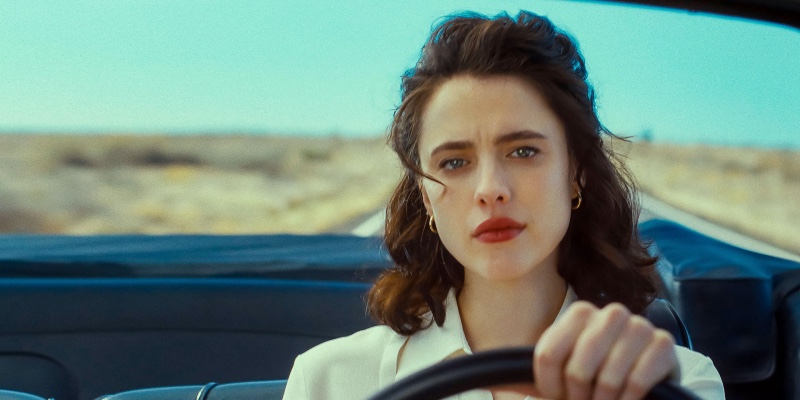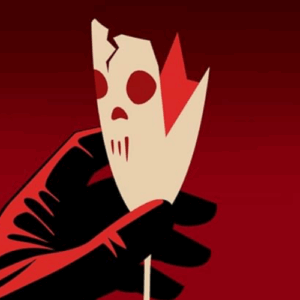In the middle of Honey Don’t, the heroic private investigator, Honey O’Donahue, interrogates Rev. Drew Devlin, a hypocritical and megalomaniac minister of a small church in Bakersfield, California. Although he promotes The Four Way Temple as dedicated to saving souls, his real business, as with so many megachurch swindlers and prosperity preachers, is to engorge his bank account, while procuring submissive sex partners from the pews. Unaware that Honey is an irreligious lesbian, the “man of God” invites her to join the congregation, his tone lascivious and his language flirtatious.
“Open yourself up. See what happens. You have nothing to lose but your fears,” Devlin tells with a Joel Osteen-like manic grin.
Honey replies: “Thanks. I’ll stick with my dildo. It helps me open myself, and it doesn’t have a creep attached.”
The scene is impressionistic of the Ethan Coen film, which he co-wrote with his wife, Tricia Cooke. The heroine is fearless and unfiltered, the dialogue is clever and amusing, and the politics, arriving in the nick of time, are subversive. At precisely the moment that the federal government, and many state governments, are under the influence of the psychotic-narcotic of Christian Nationalism, suffering the symptoms of patriarchal misogyny, homophobia and transphobia, and enacting Puritanical book bans, Honey Don’t gives viewers a timely exhibition of heroism: A proudly queer woman without a man or gun on her hip, who treats ministers, police officers, and other agents of sexist, sclerotic institutions with contempt.
Coen and Cooke have pulled off a nifty trick with Honey Don’t, as it is a movie that, by their own admission, viewers shouldn’t take too seriously, but has a deeply serious sense of politics and timing.
Honey Don’t is the second installment in what Coen and Cooke call their “lesbian B-movie trilogy.” The films, according to Cooke, have a deliberately campy tone and treatment of subject matter, along with an intentionally low-brow aesthetic. Outlets that have panned the movie, such as The New York Times, as “silly” are free to print what they would like, but it is clear that they are missing the point. Coen and Cooke aren’t aspiring to improve upon The Godfather. They are having ribald, wild, but politically potent fun.
The first of their lesbian B-movies was the 2024 film, Drive Away Dolls, a funny, but lesser film than its successor. Both star Margaret Qualley in the lead role. While she showcases great comedic timing in each film, it is her turn as Honey that reveals a Phillip Marlowe-swagger. Already building quite a resume, from a single mom fighting poverty in the Netflix series, Maid, to her monstrous role in The Substance, Qualley settles into the hard-edged, cynical, and sharp private eye archetype with ease. Cooke and Coen said that one of her goals of the film was to create a “queer world” with a “queer private detective” that was “not a big deal.”
The nonplussed attitude is central to the film’s premise and politics, and its feeling of casual disregard for convention helps the movie advance at a rhythmic pace. Like the best of investigative noir, the world of Honey Don’t feels, at once, alien and familiar. Coen explains that the film, Fat City, was an inspiration, because it offers a tour, not of the bright lights of Hollywood or Bel Air mansions, but of “bare-assed, depressed California.” The bare-assed, depressed Bakersfield of Honey Don’t establishes its own mood and aesthetic from the opening scene, while also resembling countless mid-sized American cities that are tapped-out, living on the breathing machine of late stage corporate capitalism. Instead of elegant dining, they offer hot dogs out of a drive-through window. Rather than a condominium high rise, there is a trailer park. In place of a cathedral, there is a store front church where the reverend keeps a sex pad in the back offices.
Coen and Cooke’s other noir influences add texture and color to their jagged underworld. The novel and Robert Altman film, The Long Goodbye, inform the film’s presentation of a solitary hero wandering through an America in decline where trust and loyalty are facing famine. Continuing the Coens’ long history with Raymond Chandler, Honey Don’t feels like a natural companion to the modern masterpiece, The Big Lebowski, which among many of its touches of brilliance, borrows wisely from The Big Sleep. Much of the humorous tone of Honey Don’t is reminiscent of the hilarious and underrated Paul Newman comedy-noir, Harper, which like Honey Don’t features a takedown of a cultish, religious organization as central to the plot.
While having a lesbian in the role of protagonist separates Honey Don’t from its male-led influences, there is yet another connection to make. Joseph Hansen’s groundbreaking, rollicking, and often moving series of novels about David Brandsetter, a gay insurance agent investigating claims in a similarly downtrodden California throughout the 1970s, ‘80s, and ‘90s, shares the “queer world” of Honey Don’t, and presents the sexuality of the hero as an asset, rather than a liability. It enables Brandsetter, as it does Honey, to navigate professional and underground circles, often identifying characteristics and vices that elude the eyes of the detective who lives solely within the staid center of mainstream Americana. Because of the vicious homophobia of the 1970s, and the HIV-AIDS crisis of the 1980s and ‘90s, Brandsetter’s gay identity is very much a big deal. Honey Don’t, even if it greets audience amidst a reactionary backslide in American politics, measures the progress that enables storytellers to create queer characters without explanation, apology, or tragedy.
Despite Honey’s inalterably cool composure, her life descends into chaos. Her niece, who is the victim of domestic abuse, has gone missing, one of her clients turns up dead on the side of the road, her new client’s boyfriend is murdered, and she’s involved in a scorching affair with a police officer, played with characteristic deadpan humor from Aubrey Plaza. Coen and Cooke weave all of these strands together by connecting them to The Four Way Temple.
On top of her professional and personal challenges, Honey also has to continually reject an obnoxious police detective who refuses to believe that she is a lesbian. “I like girls,” she tells him, turning around as he gives his predictable response, “That’s what you keep saying!”
There are moments, such as her conversations with the dumb cop, when the politics are subtle. There are others that function as a necessary jolt of indignation for the audience. After Honey gives her niece’s abuser his well-earned punishment – punching him in the face, knocking him to the ground, taking a hunting rifle off the wall, and holding it over his face just long enough to make him fear for his life – she walks over to his pickup truck and covers his pro-Trump bumper sticker with a replacement that says, “I have a Vagina and I Vote.”
Questions regarding exercise of the franchise supply an unnamed character, the piano player in a lesbian dive, with one of the movie’s best lines. Commenting that she hasn’t seen Honey having a drink in the bar in weeks, she warns against a “slippery slope” – “First, you stop exercising. Then, you start dating men. Then, you vote Republican.”
The movie isn’t likely to win any new converts to the cause of progressivism, but it is necessary to affirm essential values at the very moment when those values are under attack, especially in a style as pleasurable as Honey Don’t. The heroes and villains are clear, and while some critics have argued that the conclusive twist undermines the film’s political presentation, it actually bolsters it. As Honey and those of us navigating American regression have learned, there are heavy costs to confusing heroes with villains and victim-blaming. Devoting time and energy to internecine quarrels undermines solidarity, while strengthening the common enemy.
Holly’s triumph animates a politics of liberation. Without the aid of “tough guys” typical of action movies, and while operating squarely outside systems of power, she manages to save the day, outwit the competition, and ride off into the sunset after giving a wink to woman on a motorcycle.
Raymond Chandler, evidently the most enduring influence on Ethan Coen, and an important source for Tricia Cooke, compared the noir investigator to “knights in shining armor” whose “holy grail” is the truth. He also wrote, “A world in which gangsters can rule nations […] it is not a fragrant world, but it is the world you live in.”
Though they are often synonymous, one could substitute “theocrats” for “gangsters” in Chandler’s declaration. While clerical bigots and bullies acquire more power in the world we live in, Honey Don’t is a joyful, genre-informed, and edgy reminder of the imperative for modern knights, riding across an increasingly dangerous terrain, searching for the truth.

















